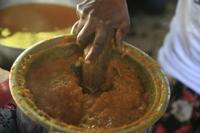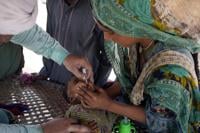PORT-AU-PRINCE, Haiti (AP) — For Wilfred Cadet, buying soup on Sunday is the equivalent of going to church.
Seated on plastic chairs next to a street food stand tucked in an alleyway, the 47-year-old Haitian slurps orange-colored soup out of a metal bowl next to his 9-year-old son.
Haitians mill past them cradling larger plastic containers, each eager to get a giant spoonful of the stew boiling in two human-sized pots behind them.
Made of pumpkin, beef, carrots, cabbage – ingredients produced on the island – soup joumou is a cultural staple in Haiti.
And in a moment of deepening crisis in the Caribbean nation, it’s one of the few points of enduring national pride.
To this day, when you mention the soup, Haitians are quick to crack a smile.
“It’s our tradition, our culture. It makes people proud. No matter what happens (in Haiti), the soup is going to stay around,” said Cadet.
During the colonial period, slaves were banned from eating the spicy dish, and would have to prepare it for French slave owners.
But Haitians claimed soup joumou as their own in 1804 when they staged one of the biggest and most successful slave rebellions in the Western Hemisphere.
The uprising put an end to slavery in Haiti far before much of the region, and the dish gained the nickname “independence soup.”
In 2021 – the same year the country spiraled into chaos following the assassination of its president – the soup was added to UNESCO’s Intangible Cultural Heritage List, the first cuisine Haiti has on the list.
“It is a celebratory dish, deeply rooted in Haitian identity, and its preparation promotes social cohesion and belonging among communities,” reads the UNESCO entry.
It’s traditionally eaten on Sunday mornings, and on Haitian Independence Day in early January.
That’s when customers begin filing through a pair of black metal gates into 50-year-old Marie France Damas’ makeshift restaurant at 7:30 a.m.
Tucked behind rows of parked cars, a brick wall with a painted sign reading “Every Sunday: Soup Joumou” and a pile of local pumpkins, Damas labors away over her two big pots just like she has for the past 18 years.
Her husband weaves between plastic tables taking orders while her daughter chops vegetables behind her. It’s a family affair, but Damas is clear.
“I’m the boss of the soup,” she said with a grin.
The business has allowed her to put her children through school and give a good life to her family in a place with some of the highest poverty and unemployment rates in the region.
To each Haitian, the cuisine means something different.
For Cadet and his son, it represents one moment of an escape from the day-to-day pandemonium of Haiti’s capital, Port-au-Prince.
It has also allowed Cadet to pass on a cherished part of Haitian culture at a time when they’re slowly fading away. Celebrations like Carnival that once took center stage on the island have withered due to deep gang violence tearing apart the nation.
“The violence in the country is making everyone leave, and over time, we’re going to lose a lot of cultural traditions,” Cadet said. “My son, of course, (will go). Right now he doesn’t like Haiti.”
He hopes that when his son goes, he’ll remember their Sunday mornings together.
To others, like 35-year-old Maxon Sucan, it’s a way to reconnect with family and home in the countryside.
He grew up in a rural town in western Haiti in a farming family cultivating the very vegetables used to make the soup.
He came to Port-au-Prince 13 years ago to support his family, and works as a manager at a nightclub.
He would once visit his family six to eight times a year, but because of kidnappings and gang control of the countryside, he’s now unable to go home.
So Sunday mornings, he drinks the soup just like he once did as a kid, and he thinks about his daughter who he sometimes goes weeks without speaking to.
“She’s three years old and it hurts me that I can’t see her,” Sucan said. “(When I eat soup joumou) I remember my family.”
As he gets ready to leave the restaurant alone, cradling a large Tupperware filled with steaming soup, he pauses.
“When I go home today, I’ll call her. And when I do, I’ll ask if she ate the soup,” he adds.
—�Ĕ�Ĕ�Ĕ
Associated Press journalist Evens Sanon contributed to this report from Port-au-Prince.










































